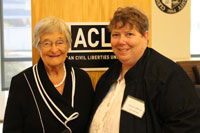News & Commentary
Inspiring a New Generation of Activists
Belle Likover and Susan Galloway
By Jocelyn Rosnick

Senate Bill 349: An Attack on Civil Rights Protections
Have you shown up to rent an apartment, but were turned away because of the color of your skin? Or because you have a disability? The law might not be on your side anymore. Discrimination in access to housing is unlawful. If a landlord is found guilty of discriminating against housing applicants or tenants, Ohio law ensures he or she will face stiff financial penalties. However, Senate Bill 349, proposed by Ohio Senator Bill Seitz (R-Cincinnati), seeks to relieve certain landlords found guilty of bias towards a person’s race, color, religion, sex, military status, national origin, disability, age, or ancestry and also prevents funding for the state’s fair housing agency. This bill allows for exceptions from the housing provisions of an Ohio civil rights law instead of securing and strengthening them. Seitz’s bill, co-sponsored by Senators Tom Patton (R-Strongsville) and John Eklund (R-Munson Township), modifies Ohio law in order to protect certain landlords from fines and attorney fees that the bill classifies as punitive. However, these “punitive damages,” collected from landlords found guilty of discriminatory actions, help fund the work of Ohio’s fair housing agencies. In a recent letter sent to the Ohio Civil Rights Commission executive director G. Michael Payton, Lynn Grosso of the U.S. Department of Housing and Urban Development expresses several concerns with the outcomes the bill would have on funding and effectiveness. Jim McCarthy, president and CEO of Miami Valley Fair Housing Center, echoes Grosso’s warning, noting that the bill would reduce the commission’s funding by more than a million dollars. Additionally, Hilary Mason King, executive director of the Housing Research and Advocacy Center, describes the bill’s potential impact as a severe injury for “families, people with disabilities and everyone else who is brave enough to confront housing discrimination.” Senator Seitz justifies the bill as necessary to prevent some of the “egregious” attorney fees that arise for the defendants of housing discrimination cases, according to a letter sent to other lawmakers in early June. The proposed amendments to the civil rights law would financially protect landlords who own no more than three single-family residential dwellings. However, Senate Bill 349 would harm a large population often subjected to discrimination based on race, color, religion, sex, military status, national origin, disability, age, or ancestry. These individuals and families that deserve equal treatment would instead have to rely upon a federal investigation rather than one from their own state. The ACLU of Ohio strongly believes that the state should protect and fortify civil rights, while Senate Bill 349 strives to chisel away at the current laws so important to liberty for all.

Juvenile Justice: The Return on Investment
This is the eighth in a series of posts focusing on issues we will be tackling at the 2014 ACLU of Ohio biennial conference, Resist. Reclaim. Restore Your Rights!

Missed Opportunities: Using Medicaid Expansion at the Local Level to Reduce Costs and Save Lives

Will Reforming the Death Penalty Become as Controversial as the Death Penalty Itself?
This is the third in a series of posts focusing on issues we will be tackling at the 2014 ACLU of Ohio biennial conference, Resist. Reclaim. Restore Your Rights!

Let’s Teach Our Children to be Good Students and Stop Training Them for Prison
What can you do?
Share the guidelines issued by the federal government with your school district.
Read the blog, Is Race Discrimination in School Discipline a Real Problem?, written by Deborah J. Vagins of the Washington Legislative Office of the American Civil Liberties Union.
Lea el blog, ¿Es la discriminación racial un problema real en la administración de la disciplina escolar? escrito por Deborah J. Vagins de la Washington Oficina Legislativa de la Unión Americana de Libertades Civiles.

Stay Informed
Sign up to be the first to hear about how to take action.
By completing this form, I agree to receive occasional emails per the terms of the ACLU’s privacy statement.
By completing this form, I agree to receive occasional emails per the terms of the ACLU’s privacy statement.


